7 August, 2025
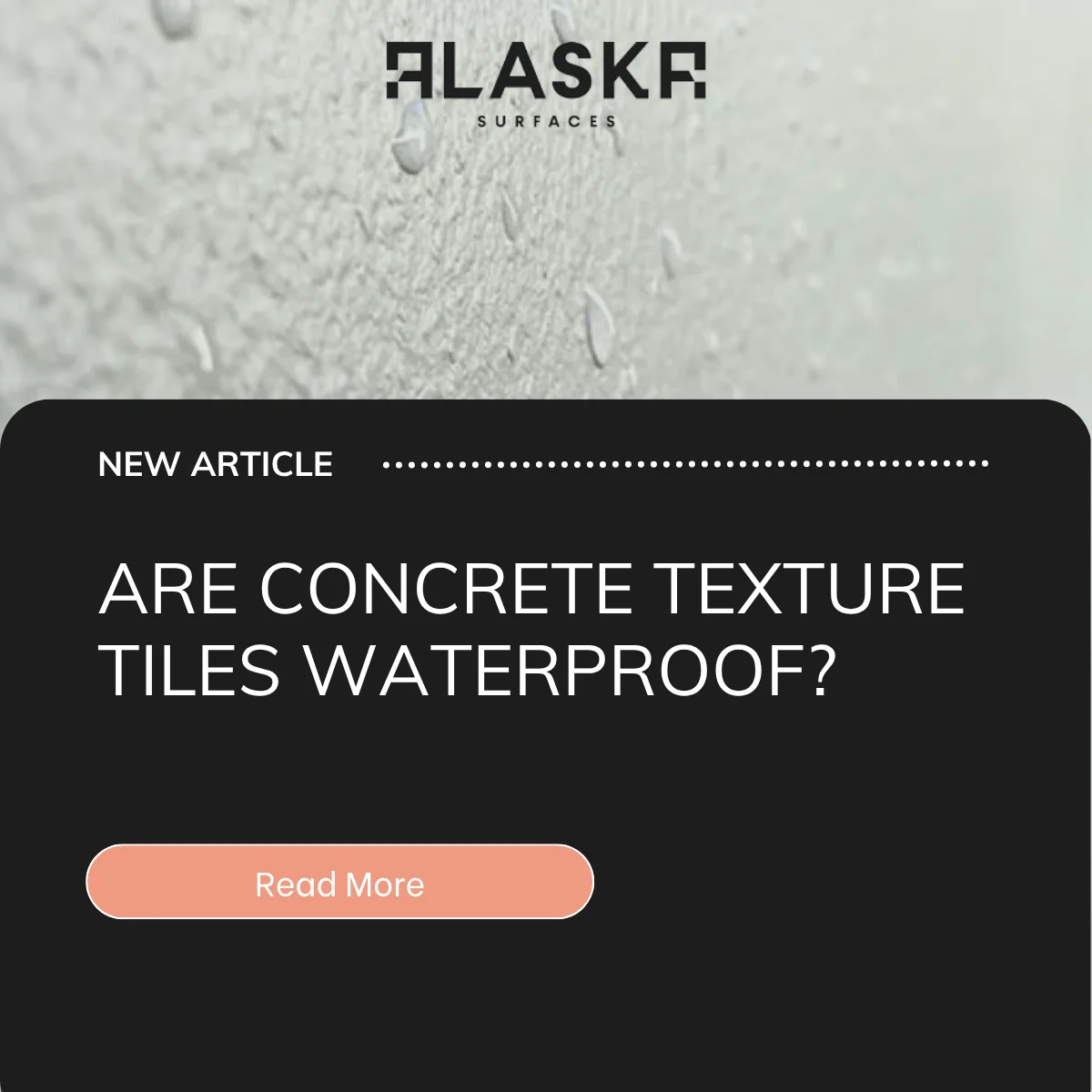
In the current construction and interior design work, the use of concrete texture tiles has witnessed an imminent change in fame. But, one pressing issue that all homeowners, builders and architects would probably continually make enquiries on is: Do concrete texture tile units get wet? It is necessary to know the properties of the waterproofing of these multifunctional tiles to make informed decisions when used in the installation of these tiles in various surroundings.
Understanding Concrete Texture Tiles
Concrete texture tiles are manufactured flooring and wall coverings in a form that is supposed to imitate the natural look and texture of concrete surfaces. Whether you're looking at concrete floor tile texture for a modern living room or textured concrete tile for a rustic entryway, these tiles combine the aesthetic beauty of raw concrete and the practical advantages that are associated with the use of traditional porcelain or ceramic tiles. The production is carried out in such a way that it produces a very detailed impression and texture, to resemble an actual concrete finish, whether smooth industrial style or rough weathered style.
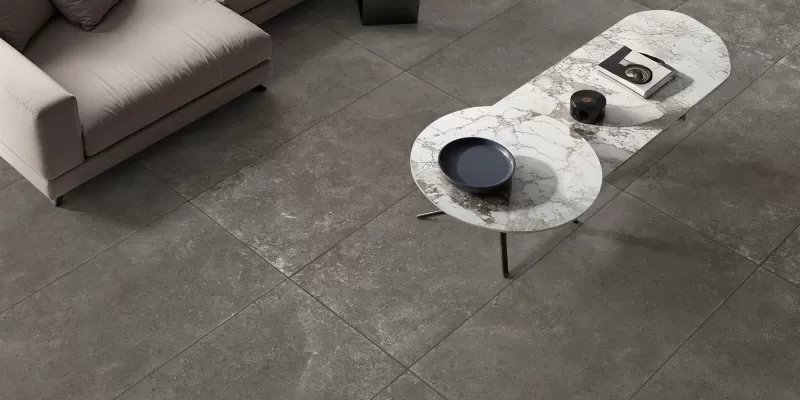
Concrete texture tile comes with combinations of quality materials that are ceramic or porcelain-based, as they are composed of a basic structure. High printing and texturing techniques make the surface look like grey concrete tile texture, and to increase protection and performance properties, protective glazes and sealants are used.
Are Concrete Texture Tiles Waterproof?
The most immediate answer is no, since the tile that is made of concrete is not in itself completely waterproof. By definition, concrete is porous. This implies that it possesses small holes which can absorb moisture with the course of time. Nevertheless, it does not imply that they are not suitable in wet places. Here’s why:
1. Sealants Make a Difference
Texture concrete tiles can be sealed to render them nearly waterproof or at least water-resistant after the usage of a good-quality sealant. This sealing film seals the pores and this renders it incapable of absorbing water and getting spoiled. Places such as bathrooms, kitchens, or outdoor patios are areas that require sealants because a lot of water is exposed to such places.
2. Tile Quality Matters
There is no uniformity in all concrete tiles. Natural porosity of precast concrete tile floor texture may also be taken away due to their density. The additions of this density, together with appropriate treatment, can suffice to have an adequate degree of waterproofing in normal home surroundings.
3. Grout Lines - A Critical Component
Grout lines (or the spaces between tiles) may also be a point of weakness when it comes to preventing water entry. The sealing of grout, which is water-resistant and regular vacuuming of the area would prevent the water from getting under the tiles and causing long-term damage.
Pro Tip: If you're installing concrete texture tiles in a high-moisture area, always pair them with a waterproof membrane underneath for added protection.
Waterproof Properties of Concrete Texture Tiles
Concrete texture tiles should have waterproof properties, which are highly dependent on the materials used to construct these tiles and also during their manufacturing process. The majority of high-quality concrete floor tile texture, made of porcelain or ceramic materials, have excellent water resistance features.
The tiles made of porcelain concrete texture have better waterproofing performance since they are dense and non-porous. In porcelain tile, the firing process employed leads to a very low rate of water absorption, less than 0.5 percent. This renders porcelain concrete texture tiles to be excellent in wet rooms such as bathrooms, kitchens and outdoor placement.
The ceramic concrete tile floor texture might also offer a decent level of resistance to water, but their absorption levels can be higher in comparison to other porcelain tiles. Even quality tiles of ceramic concrete texture do not show excessive rates of water absorption that can be found in most residential and commercial uses.
Factors Affecting Waterproof Performance
Several critical factors influence the waterproofing effectiveness of concrete texture tiles:
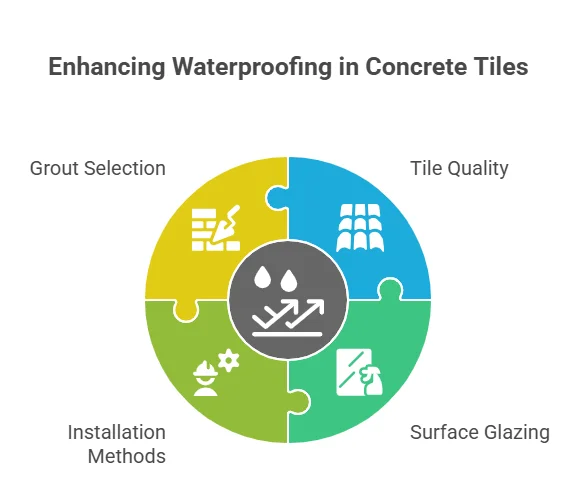
-
Tile Quality and Manufacturing Standards: High-quality concrete surfaced tiles supplied by well-known suppliers are usually manufactured using the latest in waterproofing technology. Such tiles are, in fact, very highly tested to guarantee a waterproof surface area of the tiles.
-
Surface Glazing and Protective Coatings: Concrete texture tiles highly benefit from using specialized glazes and protective surfaces that add much enhancement to a waterproof or water-resistant tile. Such treatments form an extra defense against water getting into them or getting through them, and they retain the look of seamless concrete tile texture.
-
Installation Methods and Techniques: The correct installation is also very important to make it waterproof in the best manner possible. Correct substrate preparation, adhesive choice and sealing activities, done by the desired professional, will assure the long-term application of the delved tile and the optimum intrinsic water-resistant qualities of the same.
-
Grout Selection and Application: The effects of the selection of the grout materials and the suitability of their use will directly affect the general waterproofing efficiency of the tile's surface. Computer-coded joints and sealers are used to seal the joints and seams to keep water out.
Installation Considerations for Maximum Waterproofing
The installation details are also of great concern in the concrete texture tile, in case the best waterproof performance is to be achieved. The treatment of the material used as substrate should meet the requirements of a level, clean, and sealed surface. Pre-existing moisture complications have to be resolved before the tile installation process.
-
Proper Adhesive Selection: The proper types of tile adhesives, based on the type of substrate and the environmental conditions, will maintain good and waterproof adhesion. Adhesives that are waterproof offer extra protection against the water seeping behind the tiles.
-
Sealing and Waterproof Membranes: Concrete texture tiles are waterproof and installing waterproof membranes below them can offer added shelter in a high moisture area. The membranes do not allow moisture to get down to the substrate and wreak havoc structurally.
-
Joint Sealing and Maintenance: Routine cleaning and sealing of grout lines ensures that the concrete texture tile waterproofing structure will hold up. As a result, protection against the infiltration of water is maintained through periodic inspection and resealing.
Applications Where Waterproofing Matters
Understanding where waterproof concrete texture tiles excel helps in making appropriate selection decisions:
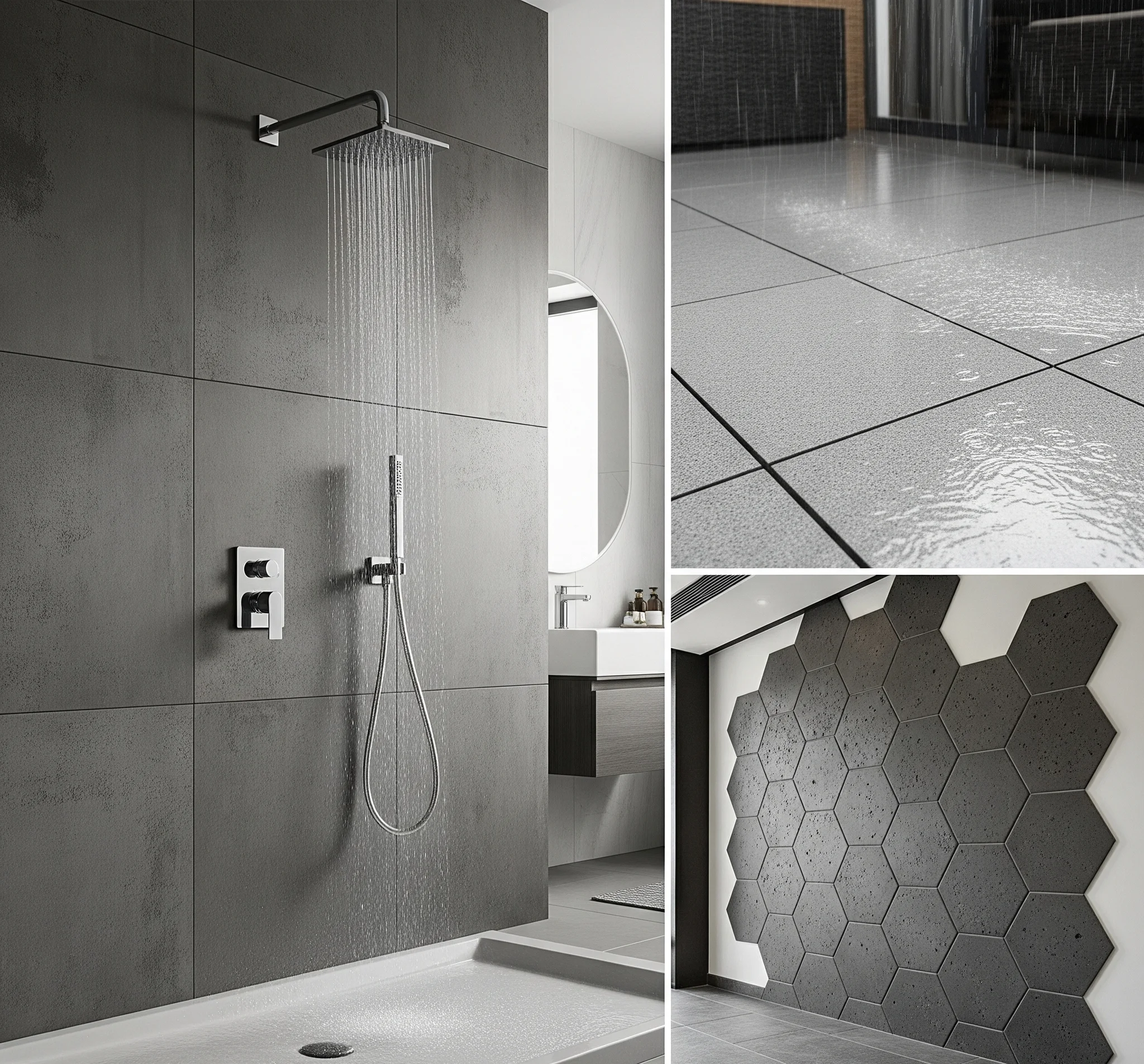
1. Bathroom Installations
Concrete textured tiles that have better waterproofing capabilities work very well when they are used in walls, shower stalls, and the floor of bathrooms. They can be used in wet rooms; this is because they resist moisture and humidity.
2. Kitchen Applications
Because of the waterproof nature of good quality concrete texture tiles, the tiles are ideal carriers of backsplashes (between kitchen cabinets and the wall), countertop surfaces and flooring where there are chances of spillage and wet floors.
3. Outdoor and Pool Areas
Porcelain concrete texture tiles are highly waterproof tiles suitable for outdoor use: patio, pool deck, exterior walls, where it is necessary to take into account weather exposure.
4. Commercial Spaces
The usefulness of concrete texture tiles in high-traffic commercial areas is associated with the durability and waterproof nature of the tiles, especially in hotels, restaurants, and shopping centers.
Maintenance for Long-Term Waterproof Performance
To ensure the proper waterproof features of the concrete texture tiles, it is necessary to take a range of care and attention. The protective surface treatments can be maintained by frequent cleaning using suitable products without degrading the tile material.
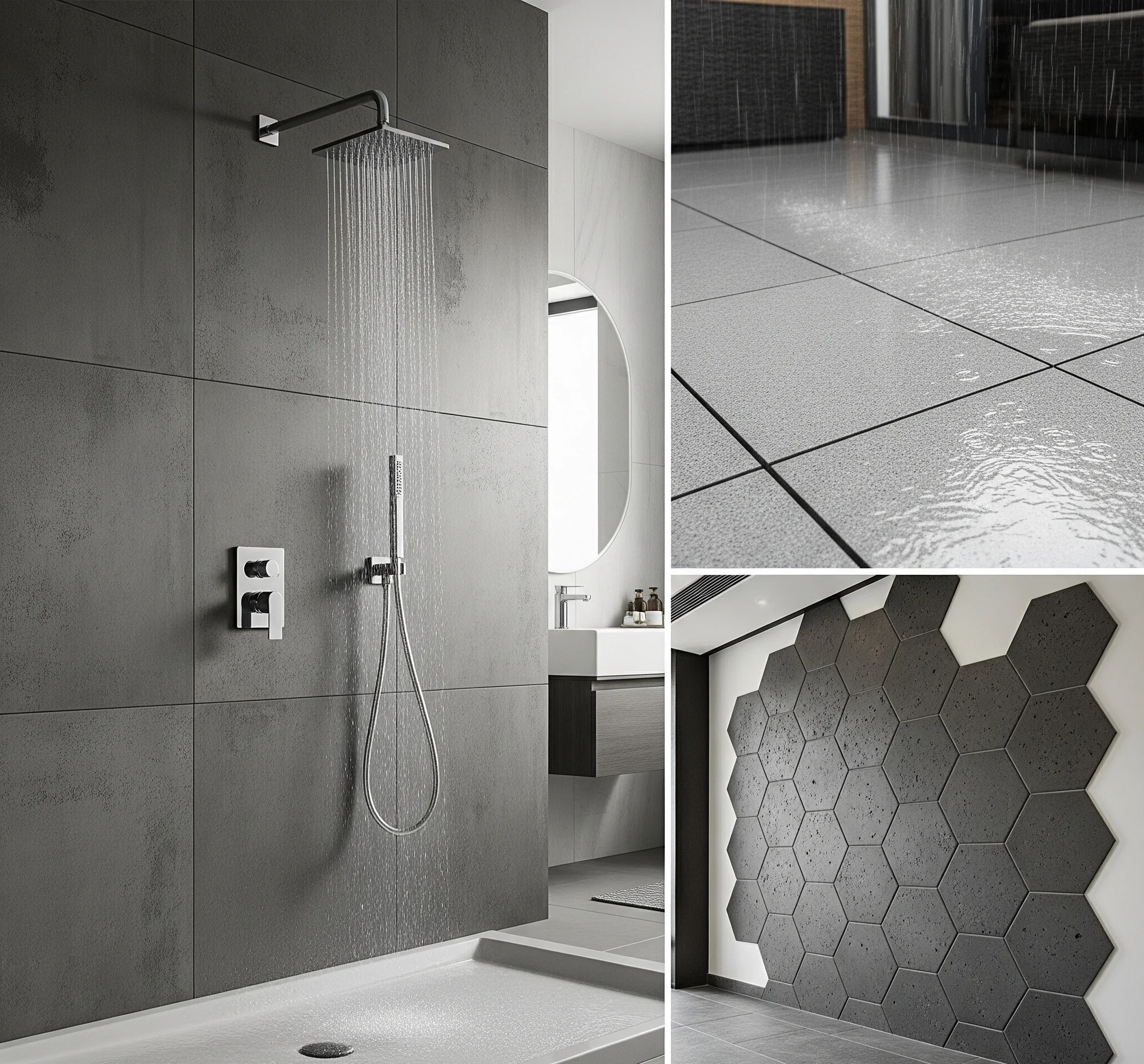
1. Seal Regularly
-
Reapply sealants every one to three years, depending on the exposure to moisture and wear.
-
Check the manufacturer's recommendations for the best sealant to use with your specific tiles.
2. Clean with Care
-
Use mild, non-acidic cleaners to avoid degrading the sealant or damaging the surface.
-
Avoid abrasive scrubbers that can scratch the texture or edges.
3. Inspect Grout and Repair as Needed
-
Grout can crack or deteriorate over time, creating pathways for water to get underneath the tiles.
-
Regularly inspect grout lines and repair or reseal them as needed.
4. Ensure Proper Drainage
For outdoor installations, ensure there’s an adequate slope for water to drain away rather than pooling on the surface.
5. Avoid Harsh Elements
Prolonged exposure to extreme temperatures or harsh chemicals can compromise both the tile and its waterproof properties. Always follow care guidelines specific to your tiles.
Where to Buy the Best Concrete Texture Tiles?
Speaking of high-quality concrete texture tiles, Alaska Surfaces is unarguably one of the top fabricators and world exporters that is committed to adding value through craftsmanship, innovative designs, and durability. Alaska Surfaces has years of experience in the ceramic industry, making it come up with a wide array of porcelain concrete-look tiles that can be utilized both indoors and outdoors as waterproof tiles.
Why Choose Alaska Surfaces?
-
Waterproof porcelain base with low water absorption
-
Diverse textures and finishes inspired by raw concrete aesthetics
-
Global export capabilities with timely delivery and competitive pricing
-
Ideal for residential, commercial, and hospitality projects
-
Backed by technical support and installation guidance
Concrete texture tiles are suitable wherever the appearance of a real concrete surface plus advanced porcelain technology is desired, whether your application is a contemporary bathroom, a fashionable coffee shop floor, or a high-traffic commercial area.
Explore Concrete Tile Collection
Visit the collection available at Alaska Surfaces and revamp your areas with waterproof glamour and architectural allure.
Conclusion
Concrete texture tiles can be considered waterproof in the event of the manufacture of good material and installation. The waterproofness of the porcelain-based concrete texture tiles is the most advanced, so that even the most problematic of moisture-prone environments are appropriate for it. Nevertheless, to achieve the best performance in terms of waterproof performance, it is important to relate to the details of installation, selection of materials and constant carrying out of maintenance operations.
Sub-standard products should be avoided when choosing concrete texture tiles to use in any project. The manufacturer should be able to give details of water absorption rates and waterproofing performances. With expert installations and regular maintenance, your concrete texture tiles should be able to ensure lasting waterproof performance with their good looks lasting into the years.